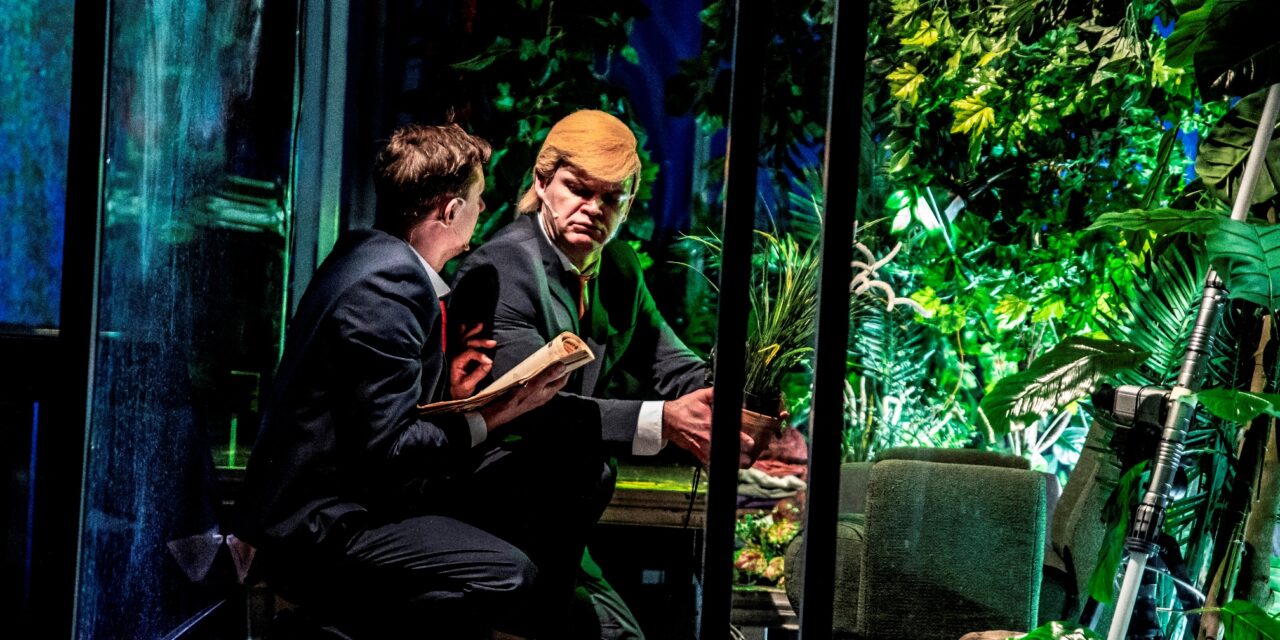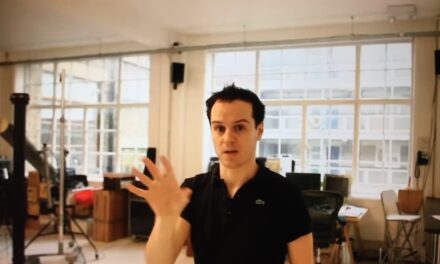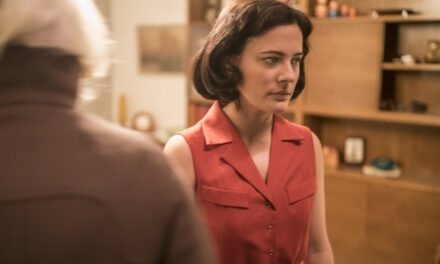Like two other plays that premiered this year, Agata Siniarska’s You Are Safe, and The Last One directed by Romuald Krężel, Trump and the Field of Maze takes on climate change. Paweł Łysak tells a multi-threaded story set in a future world poised between disaster and its aftermath, and haunted by the still unresolved problems of the past.
Just about every inch of the stage is filled with a glass structure encasing a cramped but fully appointed flat that includes a bedroom with a triple bunk bed, a dining room with kitchenette, a closet, plus a sauna and conservatory. This, however, is clearly not enough for the two men and four women that we see cooking dinner when we enter the auditorium. The atmosphere is pleasant, but the squeeze makes it unlikely that the scene is a get-together of metropolitan foodies. Later, we see other, disturbing objects, which would not be out of place in an apocalyptic setting: two gas masks hanging between white robes, small infrared cameras, one for each room, and an old barrel of oil sitting near the front stairs. The calm of the people onstage jars with the impression of a panoptic reality show whose heroines and heroes have been transported several years into the future to try and survive in a world shaped by the decisions we have made.
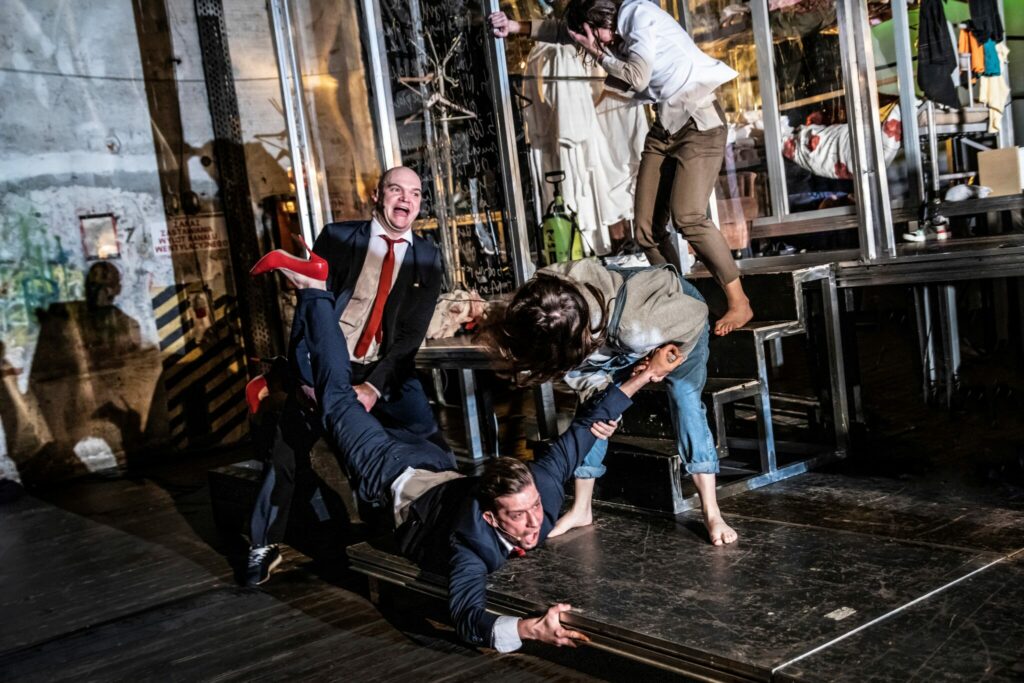
Trump i pole kukurydzy [Trump and the Field of Maize]. Photo by Natalia Kabanow/Teatr Polski w Bydgoszczy.
When the two men return to the glass bunker, it turns out they come from a different time. They have just arrived in this post-world and seem surprised their power is not taken for granted. The two men ‒ Donald Trump (Mateusz Łasowski) and his advisor (Damian Kwiatkowski) ‒ realise that the world has changed. If the crisis can no longer be dismissed, the world in crisis must be colonised, and fair rules of coexistence, only for humans, of course, must be established. So, first of all: ‘There is democracy’ ‒ the American president and his companion set about rearranging the world. Their efforts, however, are met with the condescendingly dismissive response of the women, giving rise to the juxtaposition, which seems to be significant for the entire play, between the masculine, representing the past, and the feminine, which anticipates change. The resulting boundary is not fully convincing though, and its meaning is lost in the chaotic dramaturgy of the play.
The story of the two exponents of anthropocentric, capitalist patriarchy is split into two intertwining storylines enacted by the same performers. The American president is joined by his wife Melania (the casting of Kwiatkowski in this role does not open the door to further critical reflection, and the way the part is rather stereotypically infantilised is sometimes dubious). Between their scenes, the creators introduce another duo, of rather inept ‘bad white guys’, as they proudly refer to themselves. The views and attitudes of both duos are disgrace. Inspired by a botanical piece in Newsweek, Trump, who is paranoid, tries to intercept communication between maize seedlings to expose their conspiracy. The other duo seem to take no heed of the general shift in perceptions, they are only interested in restoring the old order. Their reactionary approach, however, remain within the realm of pure phantasmagoria. Now and then they come forward towards the audience in bathrobes, clutching blunt knives, and talk about dispatching all vegan lovers of slow life to Mars, but this is all they can muster. It might seem this ironic trivialisation is meant to close the discussion on the origins of the crisis and reorient attention to a new vision of solving it, to create space for a shift in perspective which seems to be the key challenge for contemporary eco-activism. The problem is that the antithesis to the discredited male gaze, introduced at the start of the play, makes us look for an alternative in the actions of the four women, which are rather wishy-washy. They do not seem to share any strategy of common resistance. The most resolute position is taken by the ‘sorceress’ who is revealed to be a former ichthyologist dissatisfied with the hierarchical relationship with her ‘object of study’. Now she talks to the plants she has preserved in her garden. Her clichéd attitude is strikingly superficial though. ‘The sorceress’ is the embodiment of the ideas of those who see the ecological turn as a frivolous whim rather than a real alternative.
As it soon turns out, Trump and the Field of Maize offers no room for an exercise in alternative perspectives or for discovering one’s entanglement, of which Timothy Morton writes: ‘my entire physical being is caught in its meshwork’. The play staged in Bydgoszcz is an attempt to come to grips with the complexity of the Anthropocene rather than a quest for a post-anthropocentric narrative. Over a succession of scenes, an environmental disaster unfolds, whose symptoms are not always acknowledged as linked to each other. The creators invoke and distort a number of contexts to reveal some paradoxes of the world of the second decade of the 21st century.
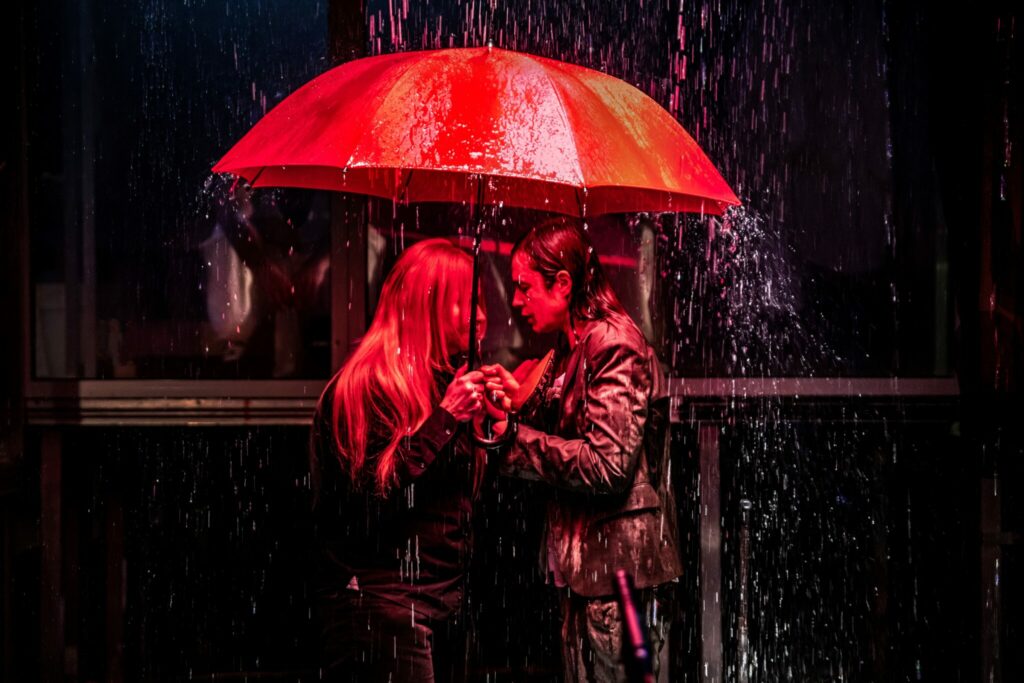
Trump i pole kukurydzy [Trump and the Field of Maize]. Photo by Natalia Kabanow/Teatr Polski w Bydgoszczy.
By the way, this gives rise to another question. It seems that the critical strategy adopted in the play does not fit the subject matter. The ecological disaster is portrayed as another urgent social issue that can be objectively problematised. Everyday attitudes are given a theatrical representation and are confronted with one another in an almost dialectic, if ironic, way. The creators, as well as the audience, can take an external, evaluative position, which stands in stark contrast with the increasingly popular proposals of ecological thinkers, in which people do not hover above the crisis with a perfect view of all its aspects, but plunge straight into it. This inevitably prompts the question: Is there not a gaping hole in the initial assumptions if the shifts in the perception of human subjectivity are disregarded despite criticism of man’s destructive activity?
Trump and the Field of Maize leaves you feeling you would like to go one step further, enter the field of experiment where the language of new eco-activism harnesses the specific power of theatre. Yet the creators of the play follow the path of accumulating contexts and providing a multifaceted description of the problem, which, in my view, is not effective in the context of the ongoing crisis. This is a pity as the problem is getting steadily worse, and Trump has not yet turned into popcorn as he does in the finale of the Bydgoszcz play.
Trump i pole kukurydzy [Trump and the Field of Maize] by Artur Pałyga
Directed by Paweł Łysak; stage design by Robert Rumas; costumes by Konrad Parol; video by Tamara and Piotr Wyrzykowscy; music by Stefan Węgłowski; lights by Robert Łosicki; artistic collaboration Anna Włodarska.
Premiered on 16 February 2019
References:
Timothy Morton, Hyperobjects: Philosophy and Ecology for the End of the World (Minneapolis: University of Minnesota Press, 2013).
This article was originally published in Polish by Didaskalia. Theater Journal 2019, no. 151-152. It was translated into English for Didaskalia and TheTheatreTimes.com and reposted with permission.
This post was written by the author in their personal capacity.The opinions expressed in this article are the author’s own and do not reflect the view of The Theatre Times, their staff or collaborators.
This post was written by Maciej Guzy.
The views expressed here belong to the author and do not necessarily reflect our views and opinions.

